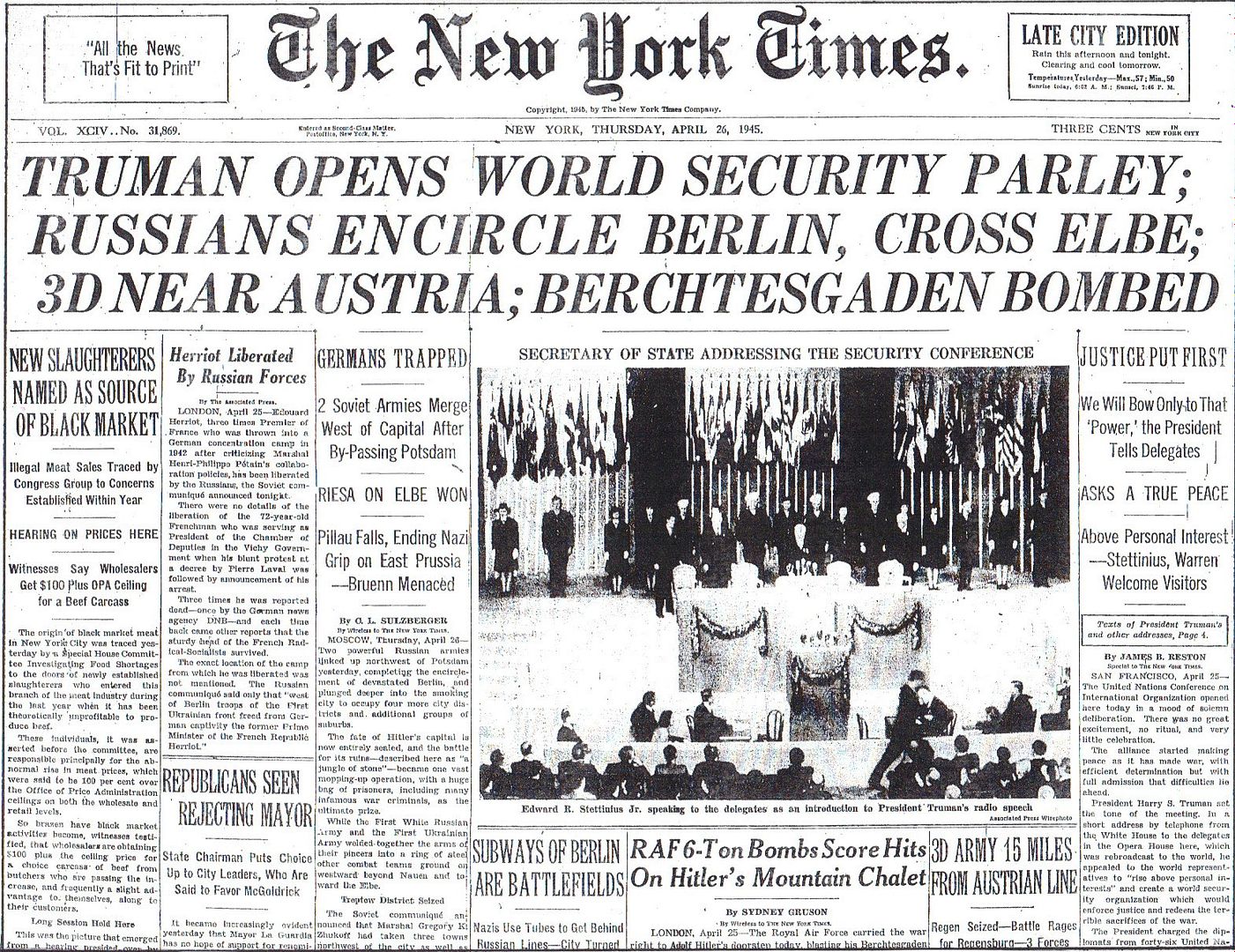
Posted on 04/26/2015 4:35:34 AM PDT by Homer_J_Simpson

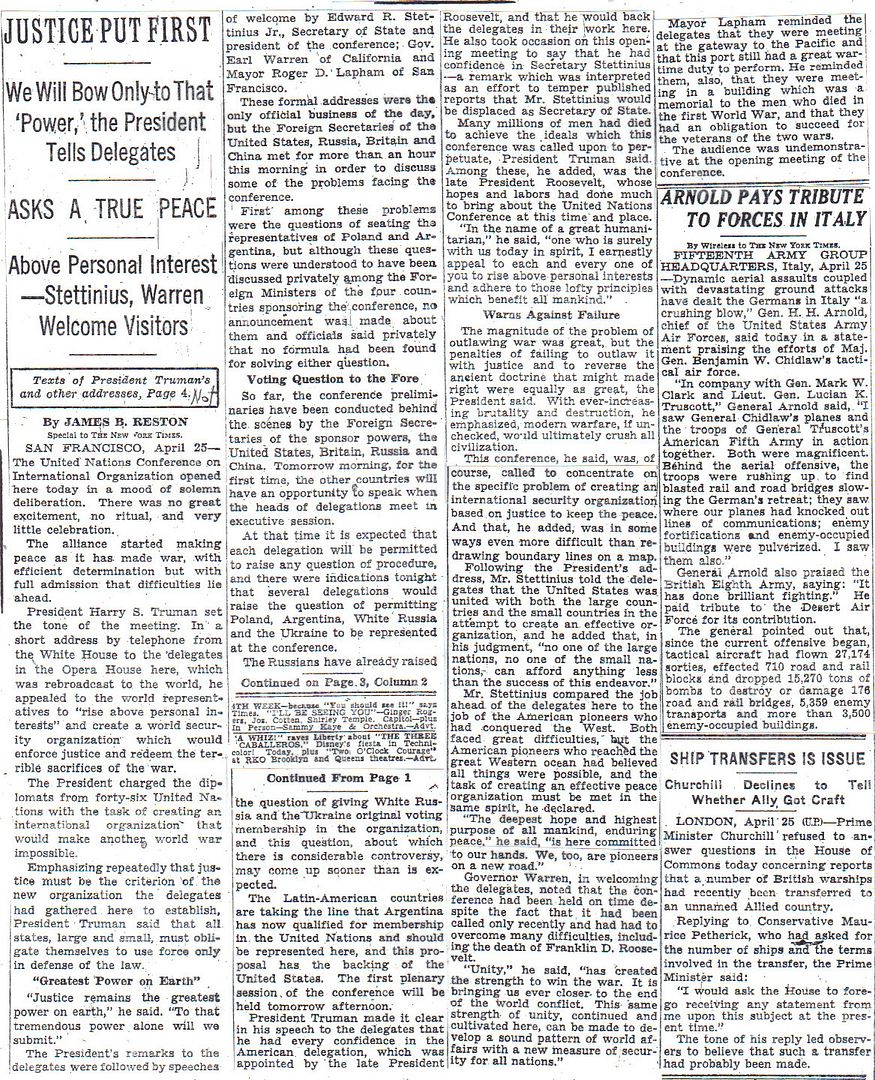
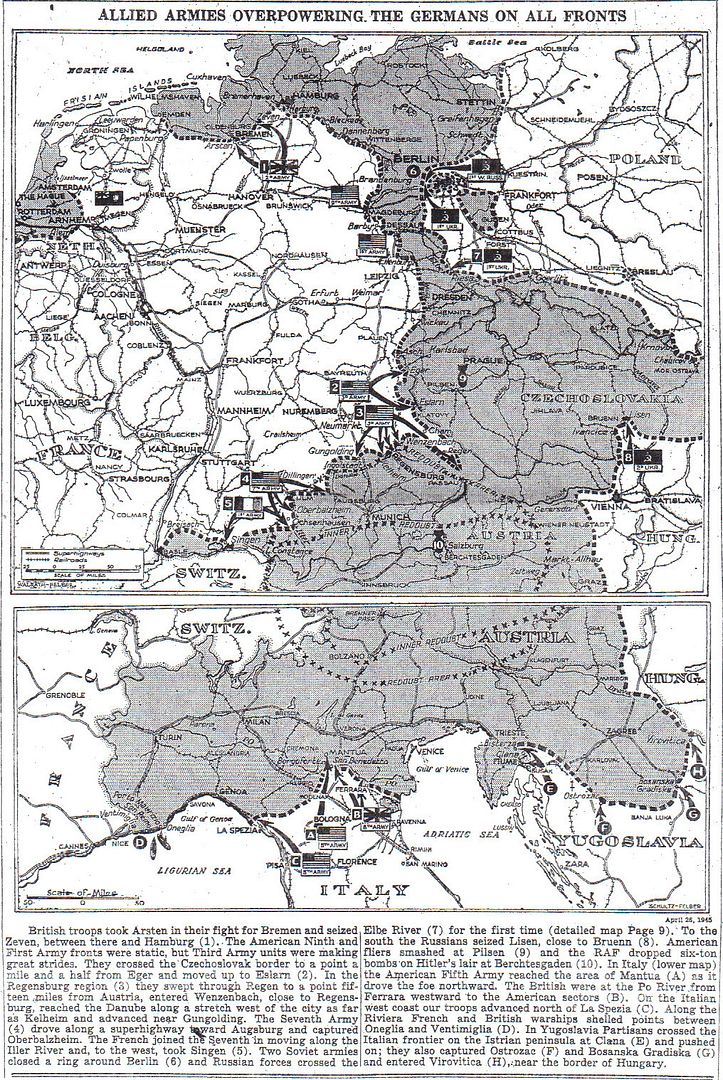
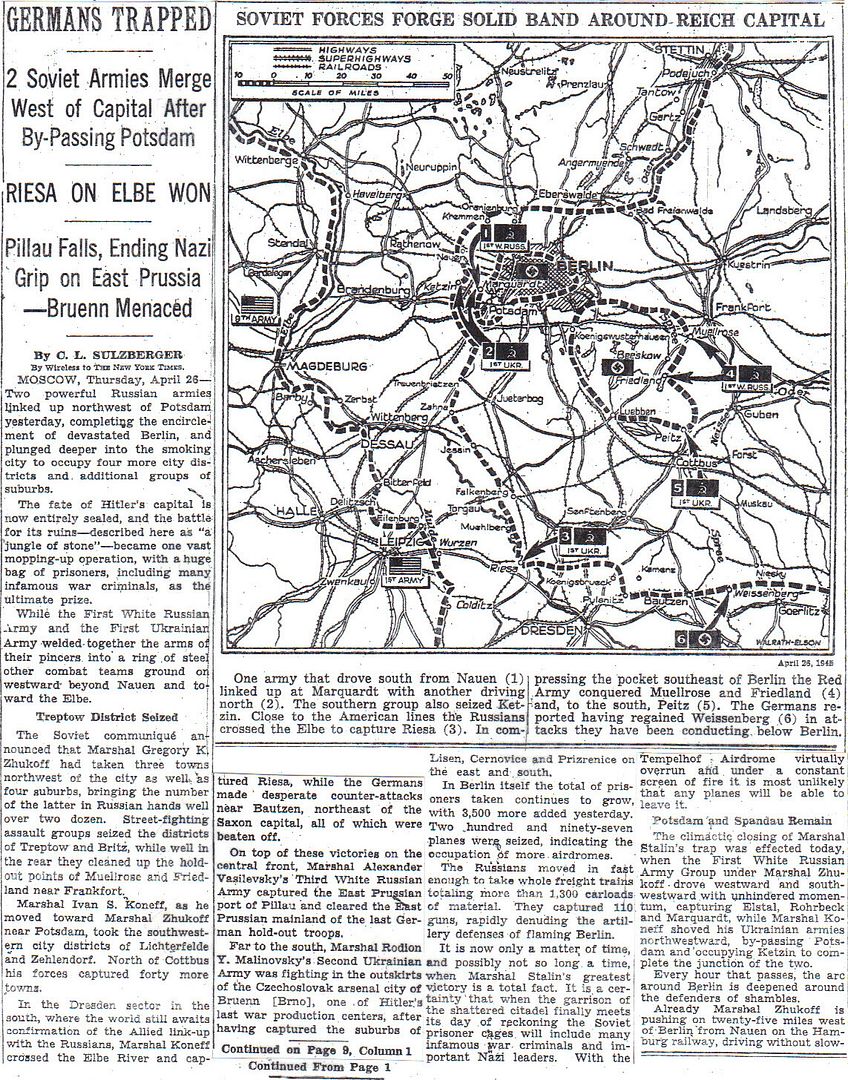
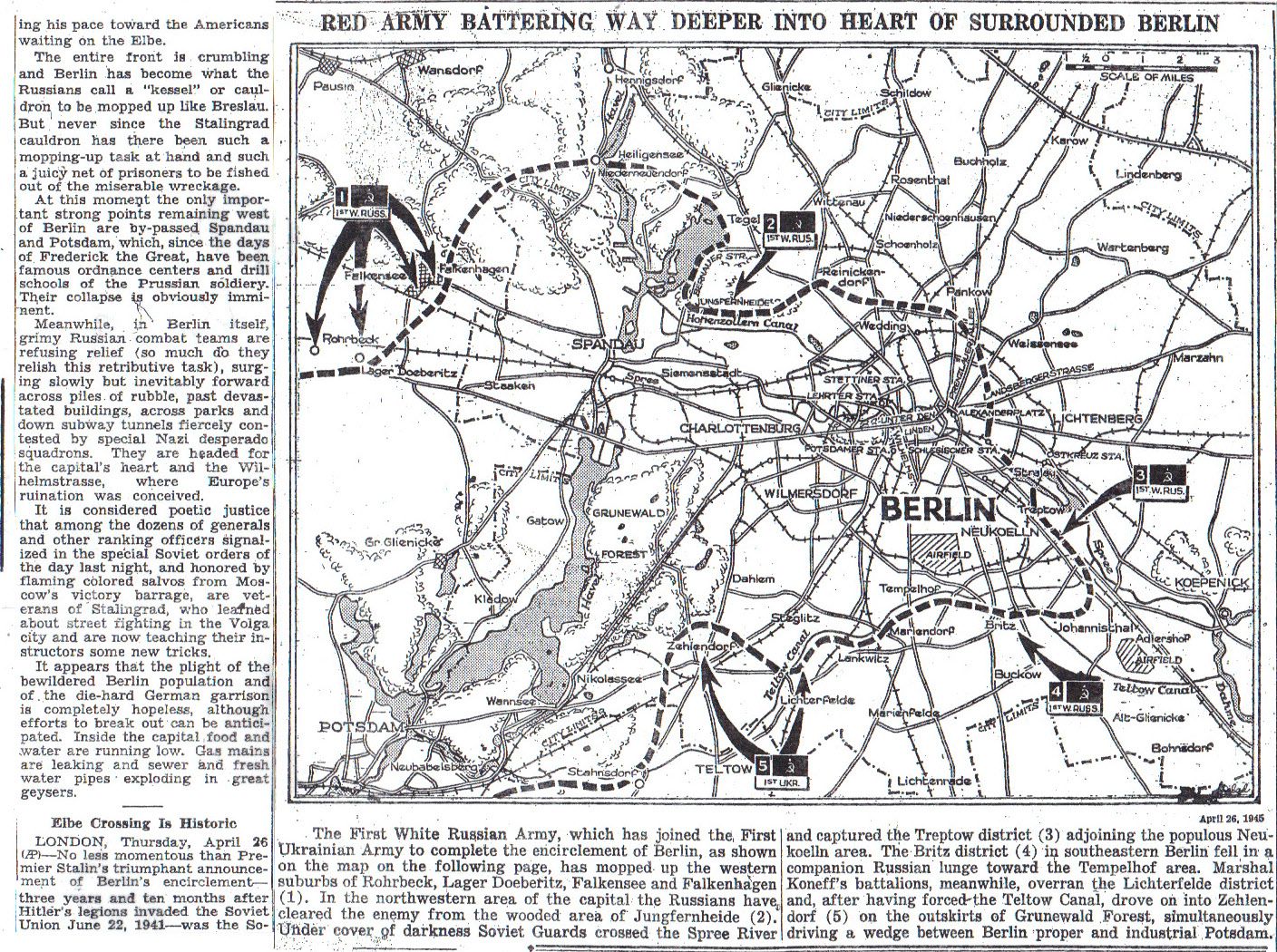
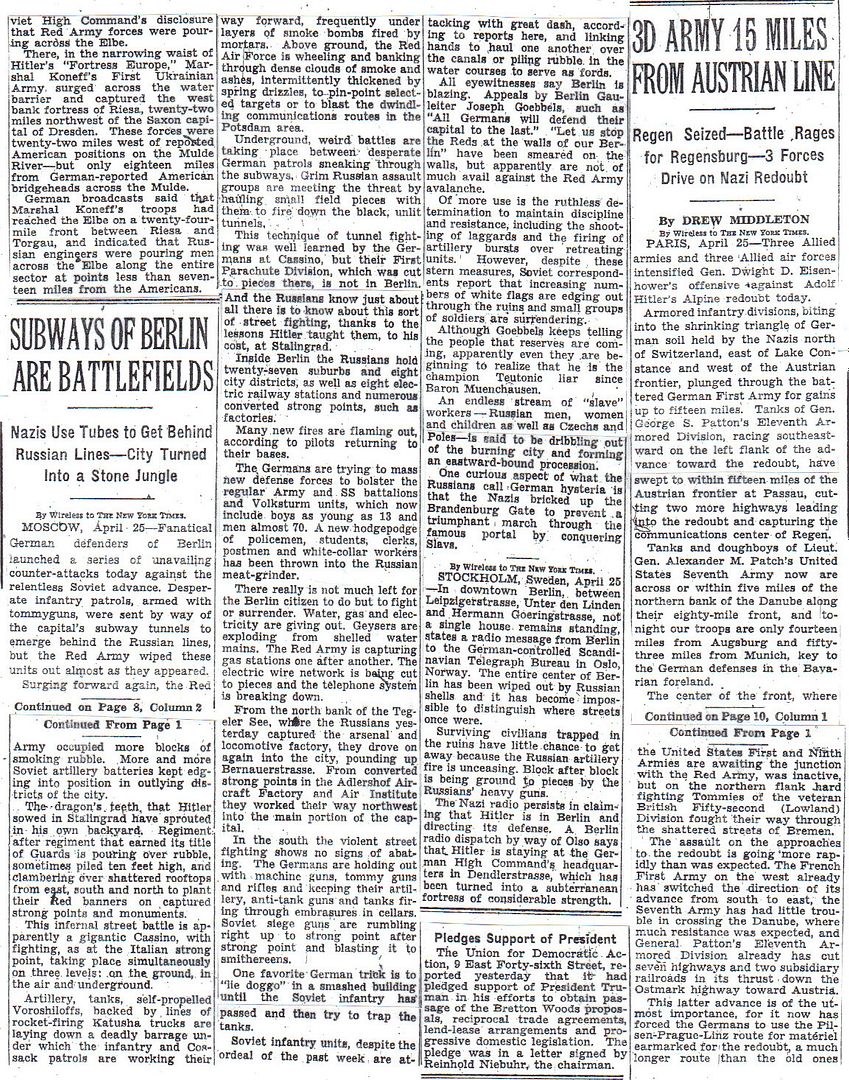
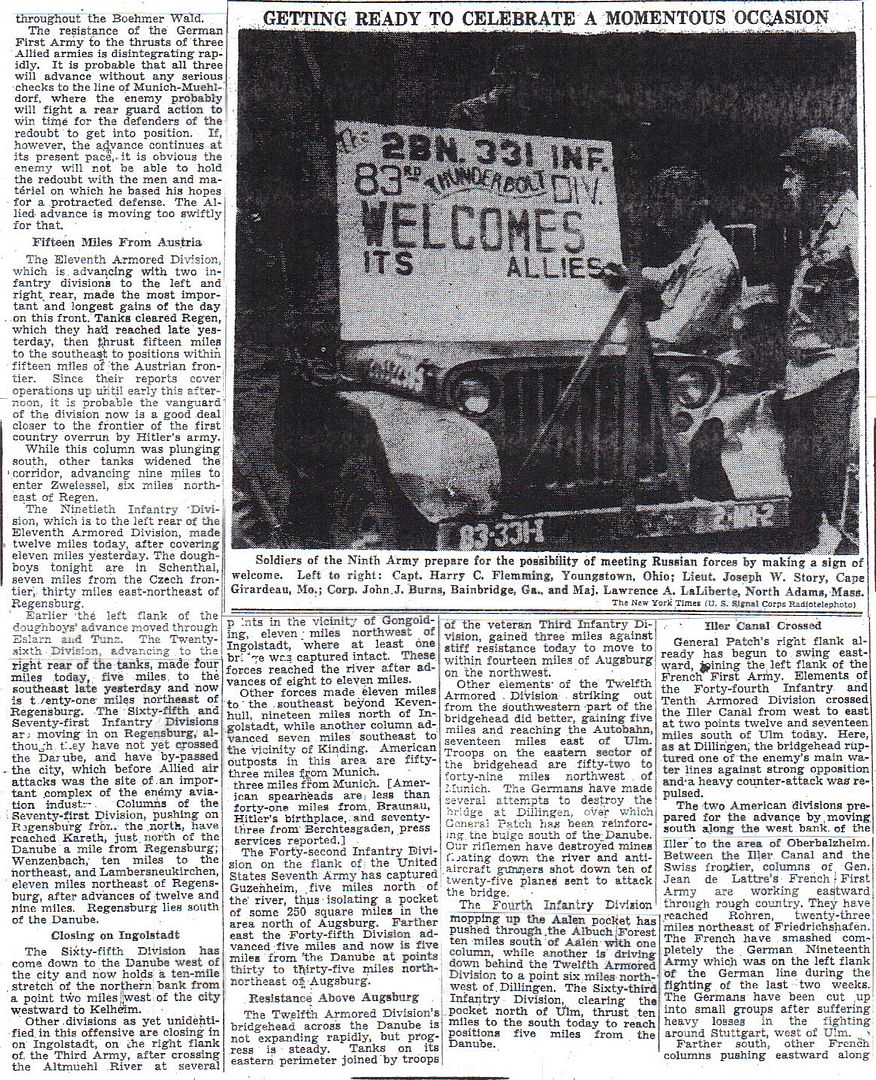
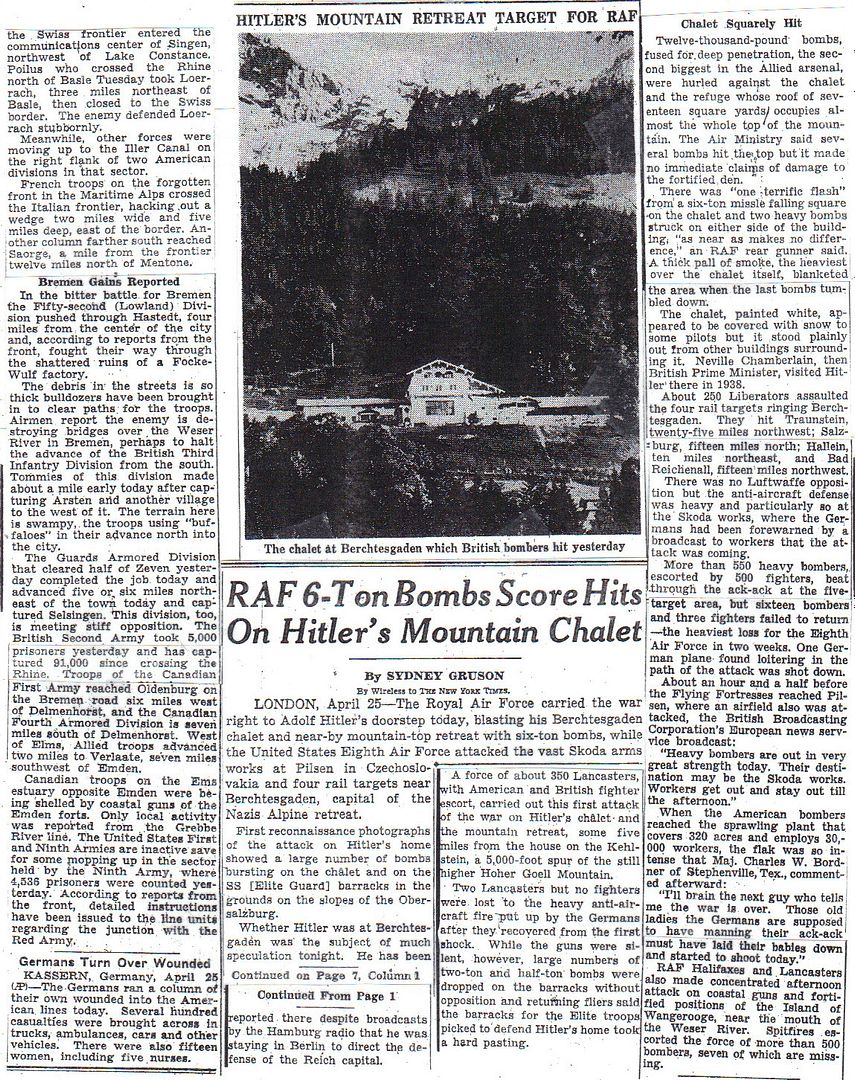
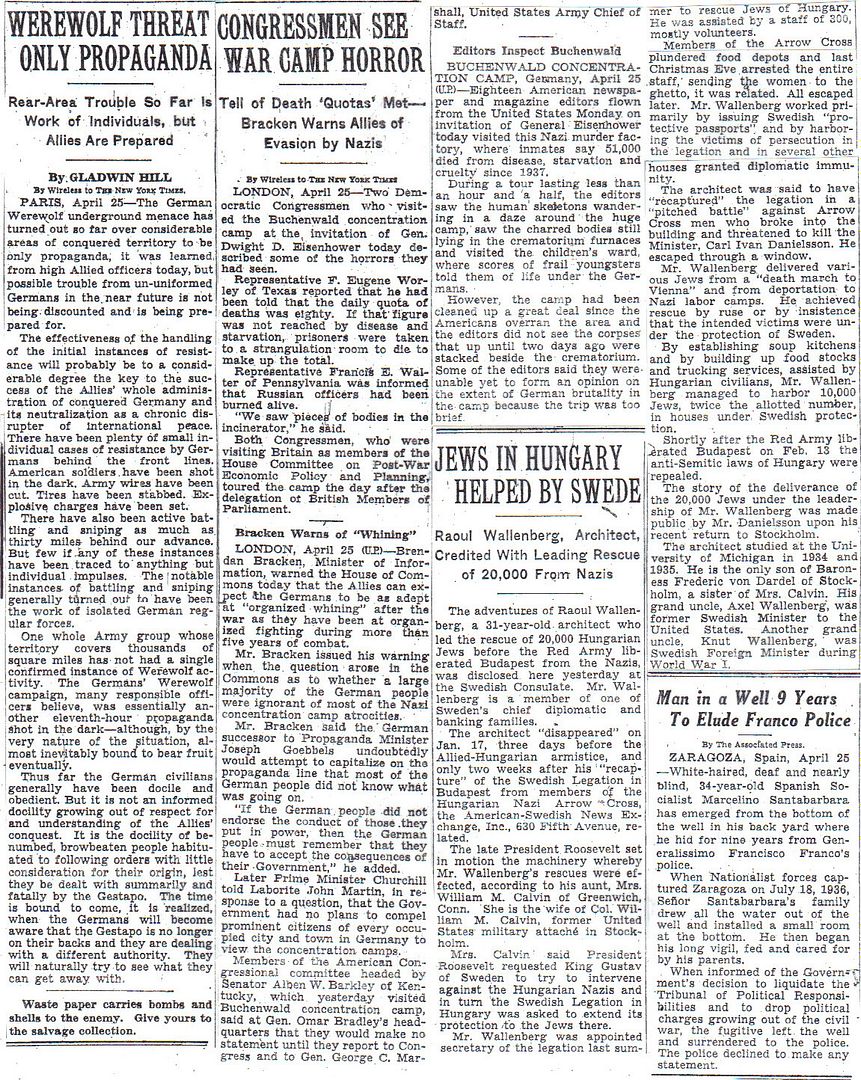
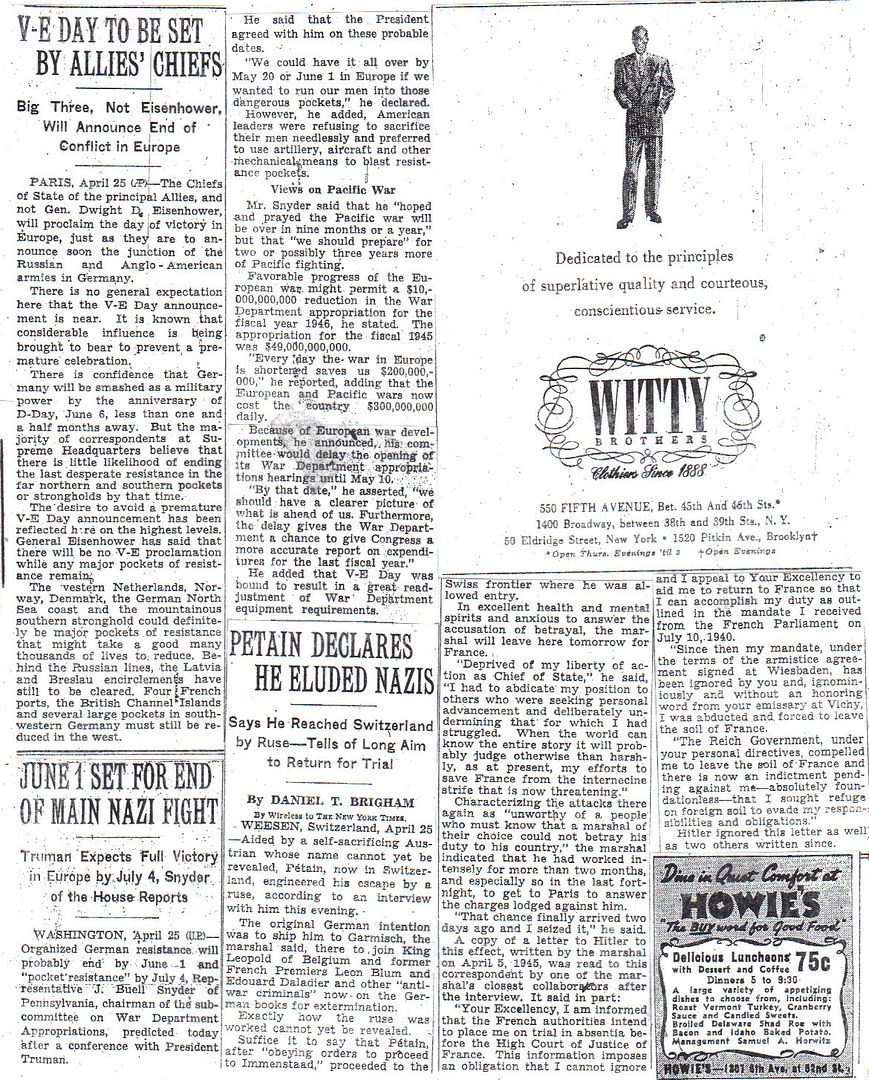
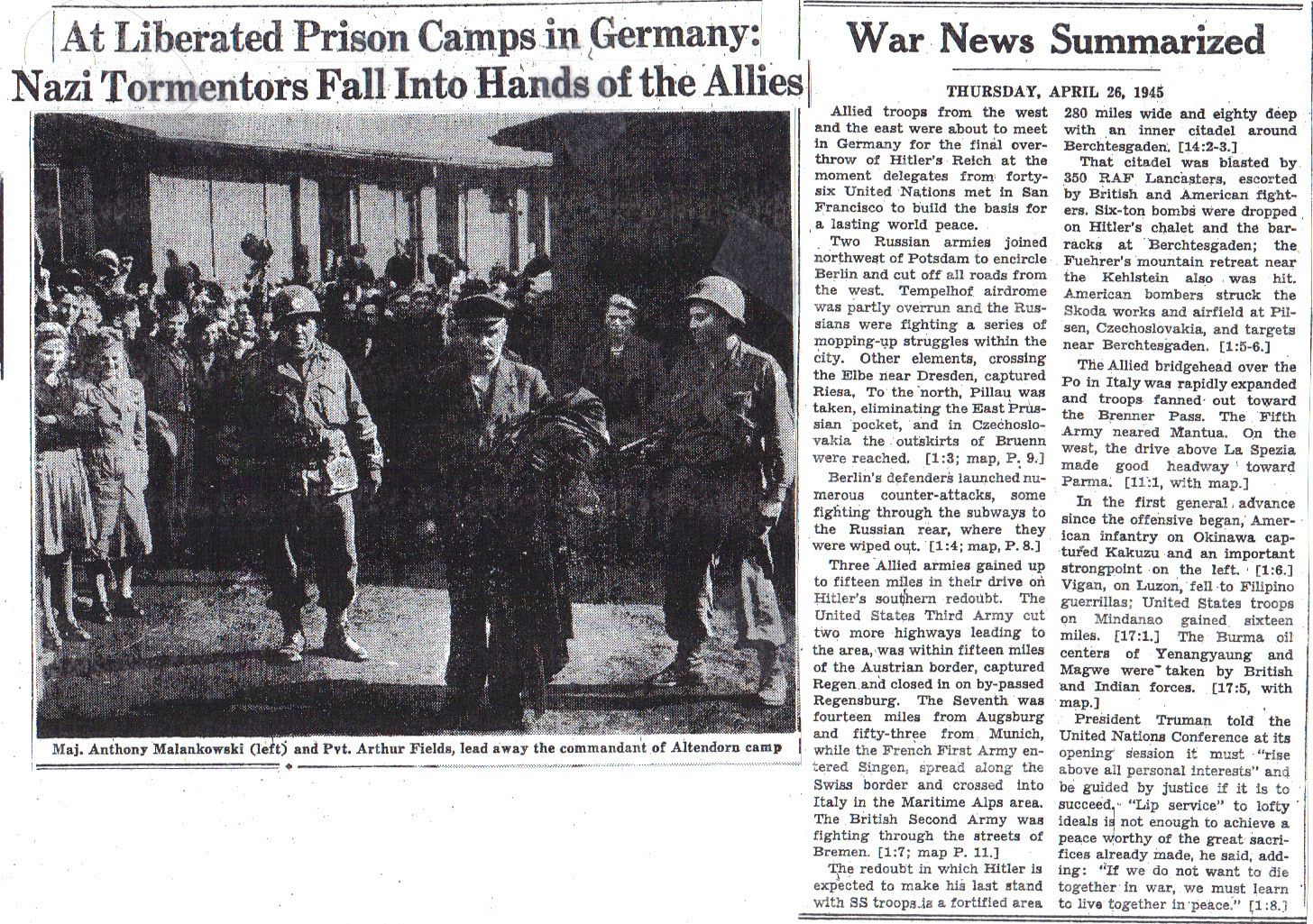
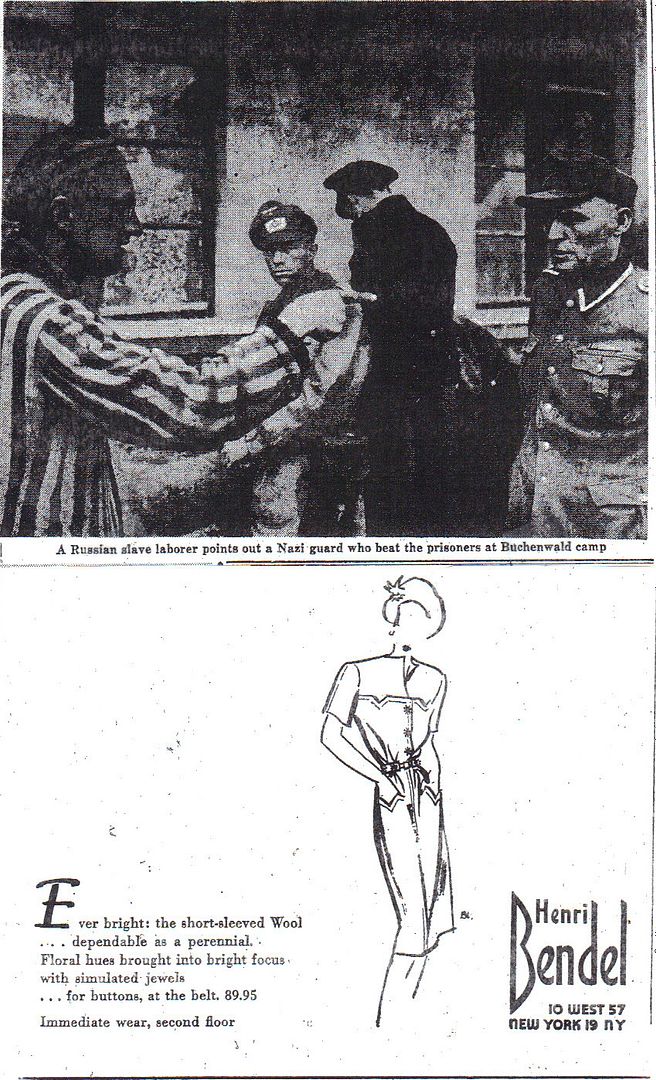
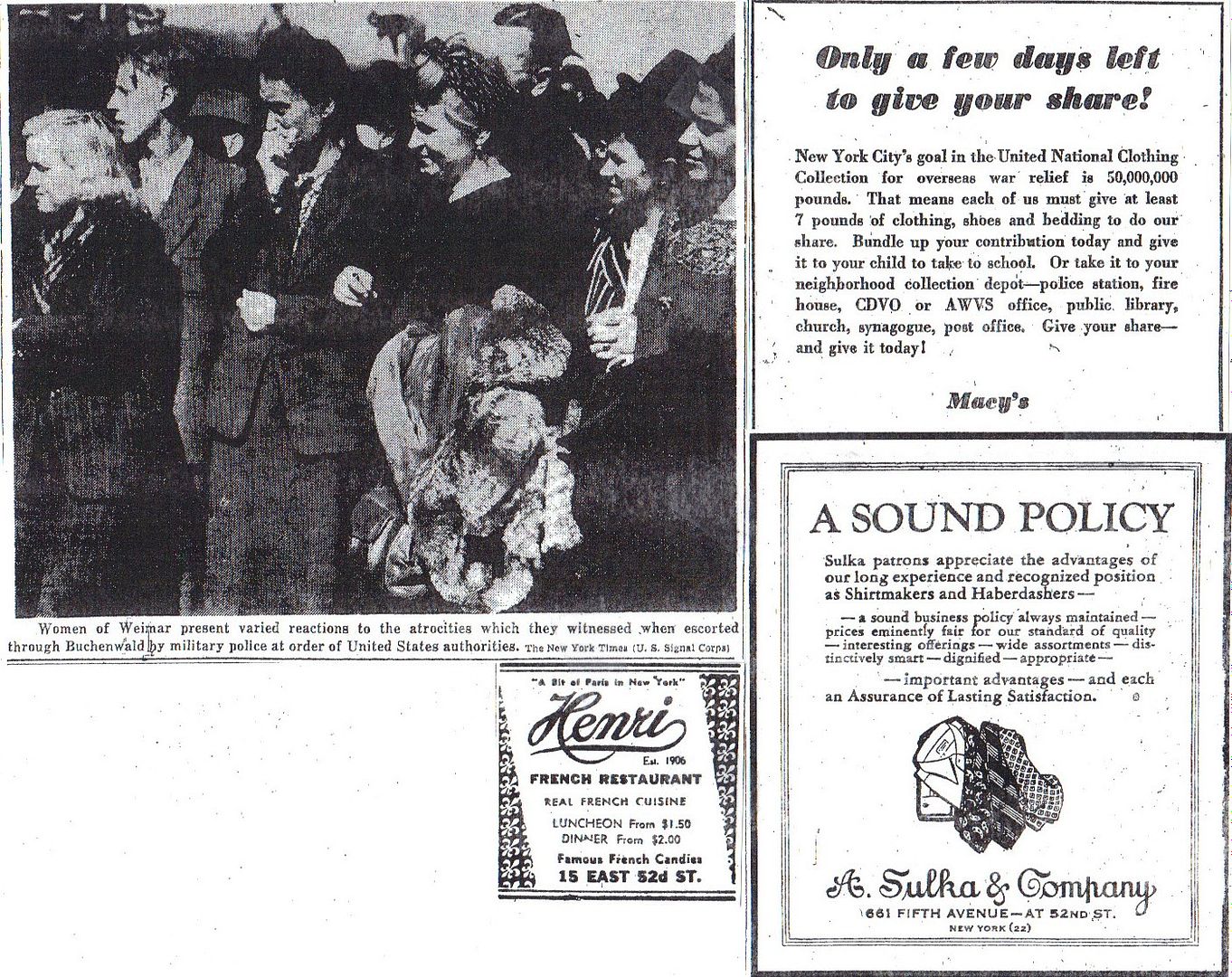
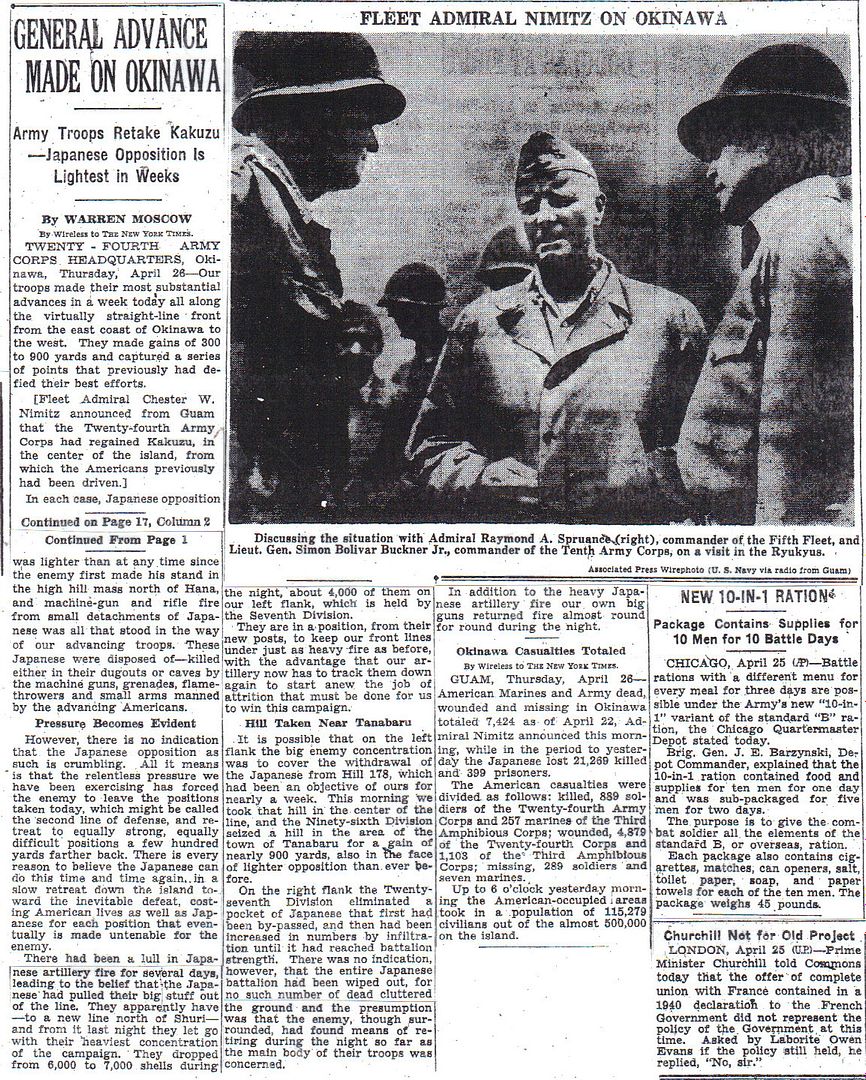
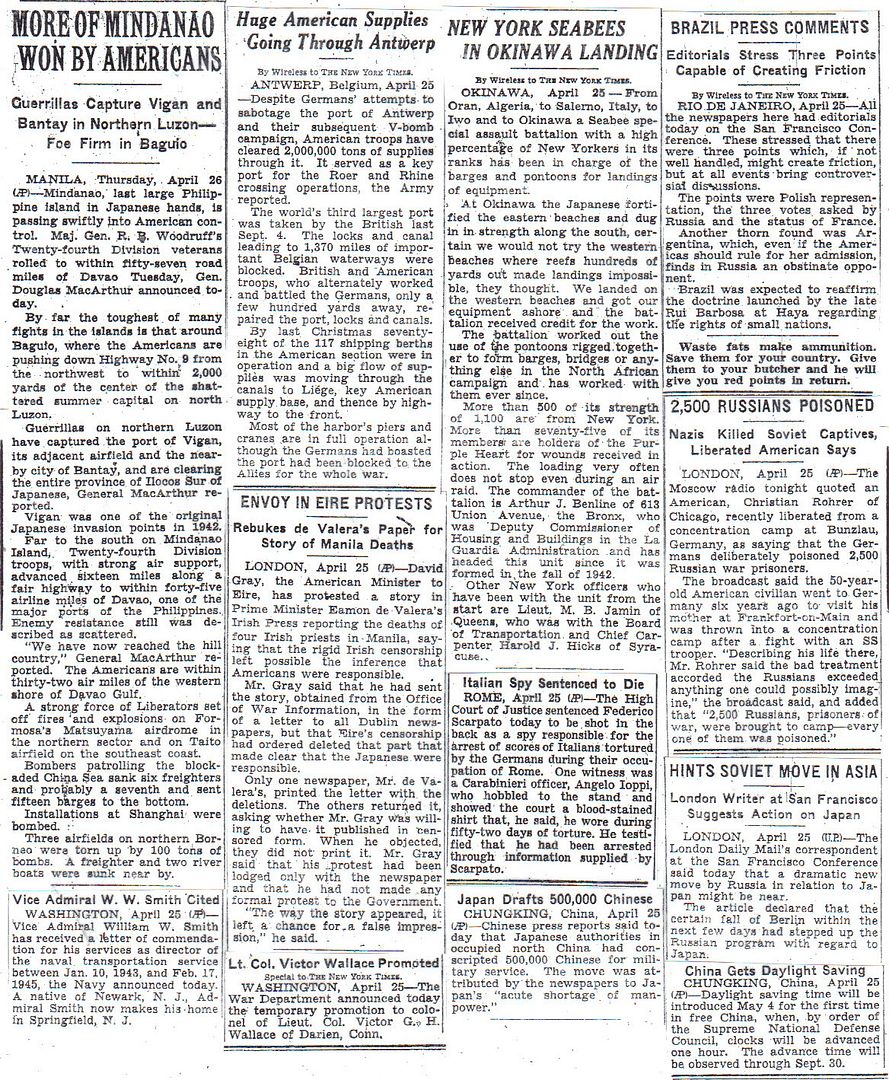
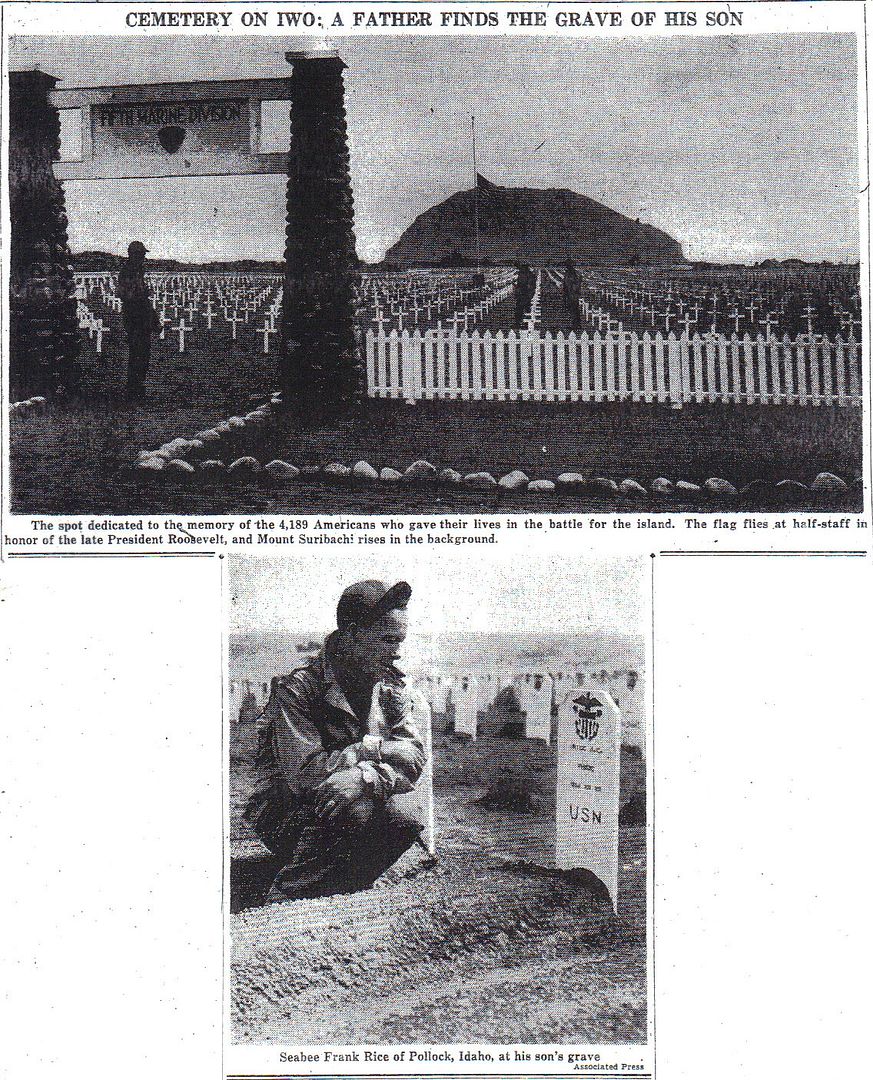
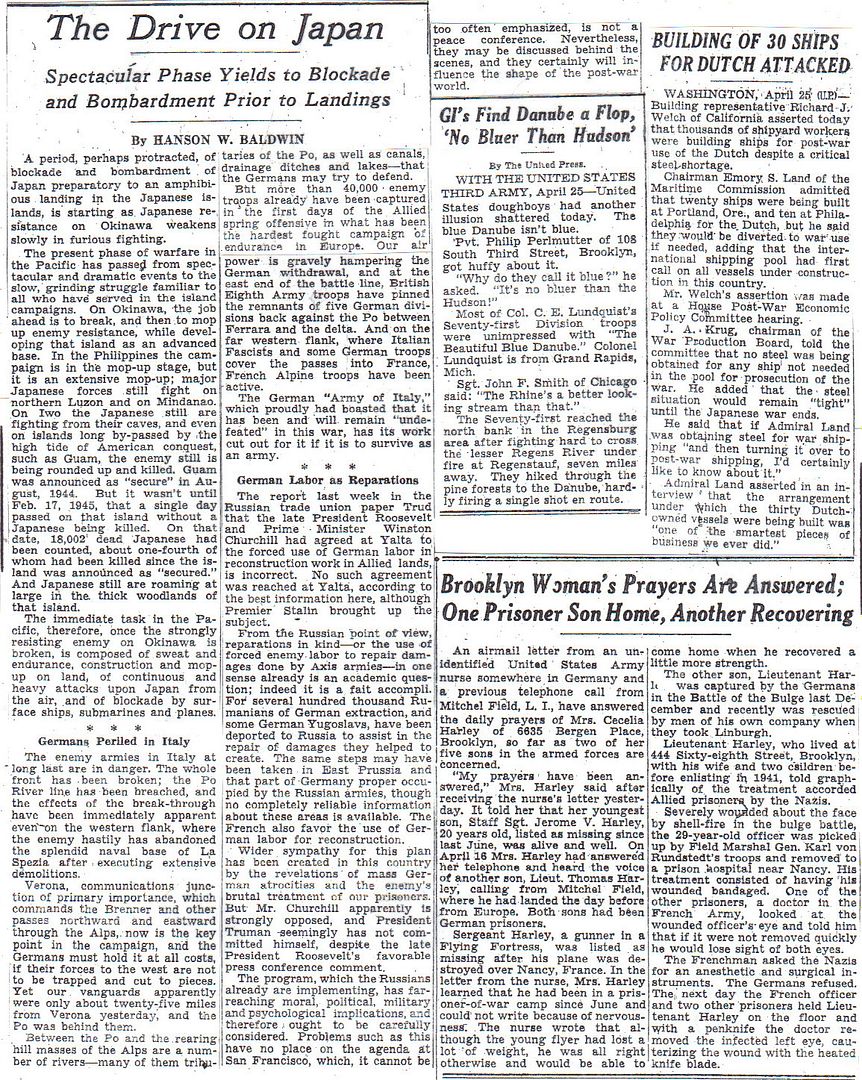
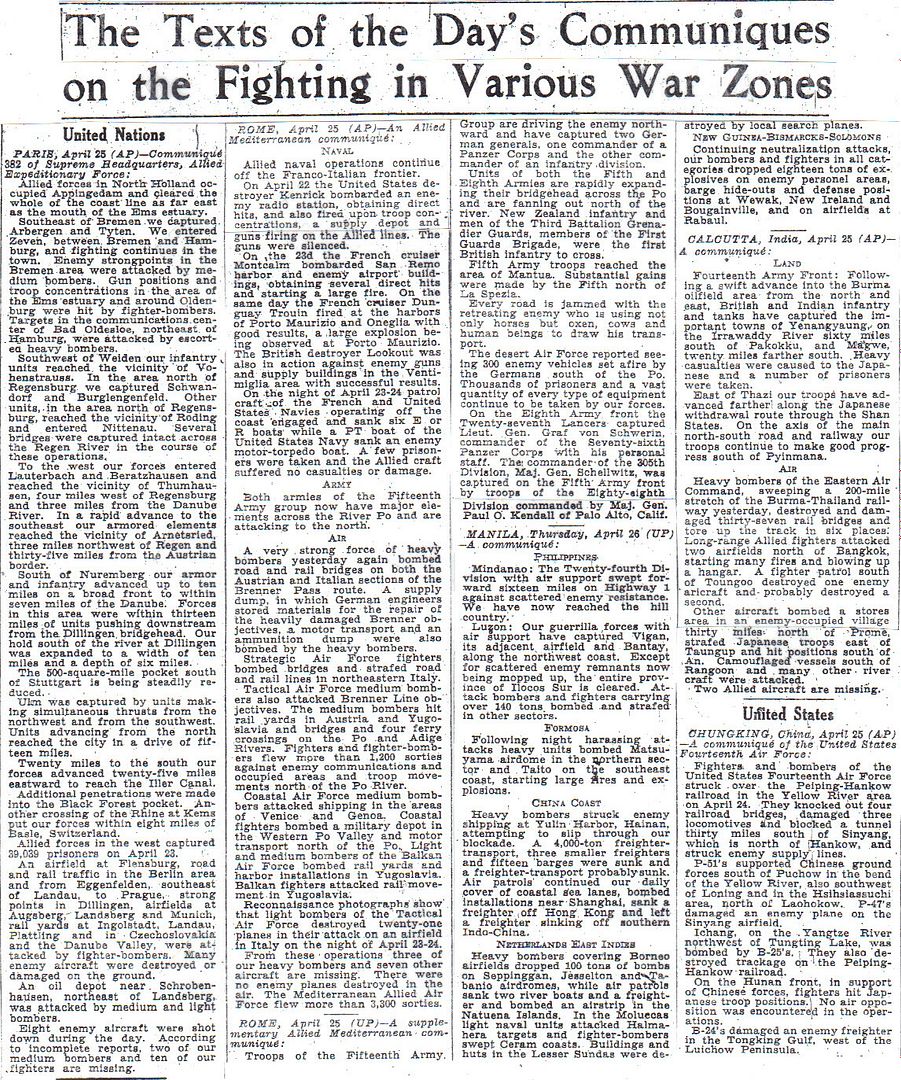
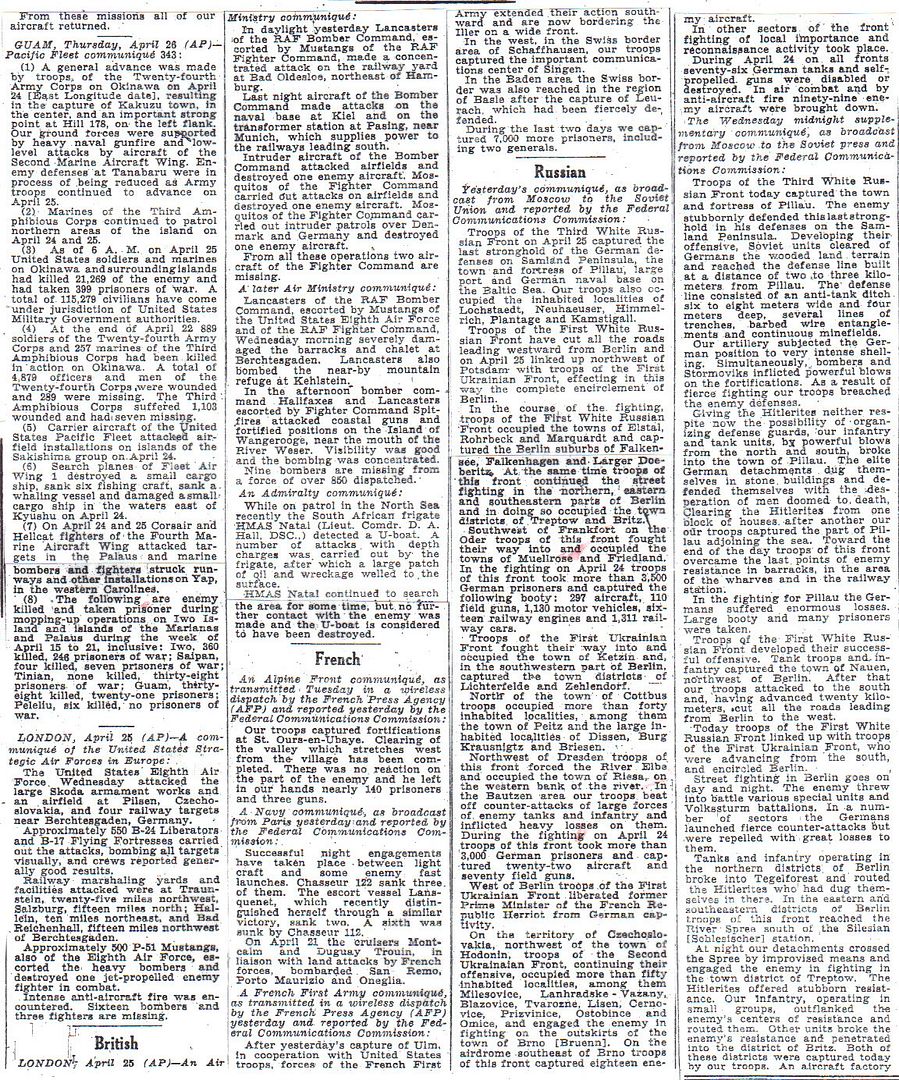
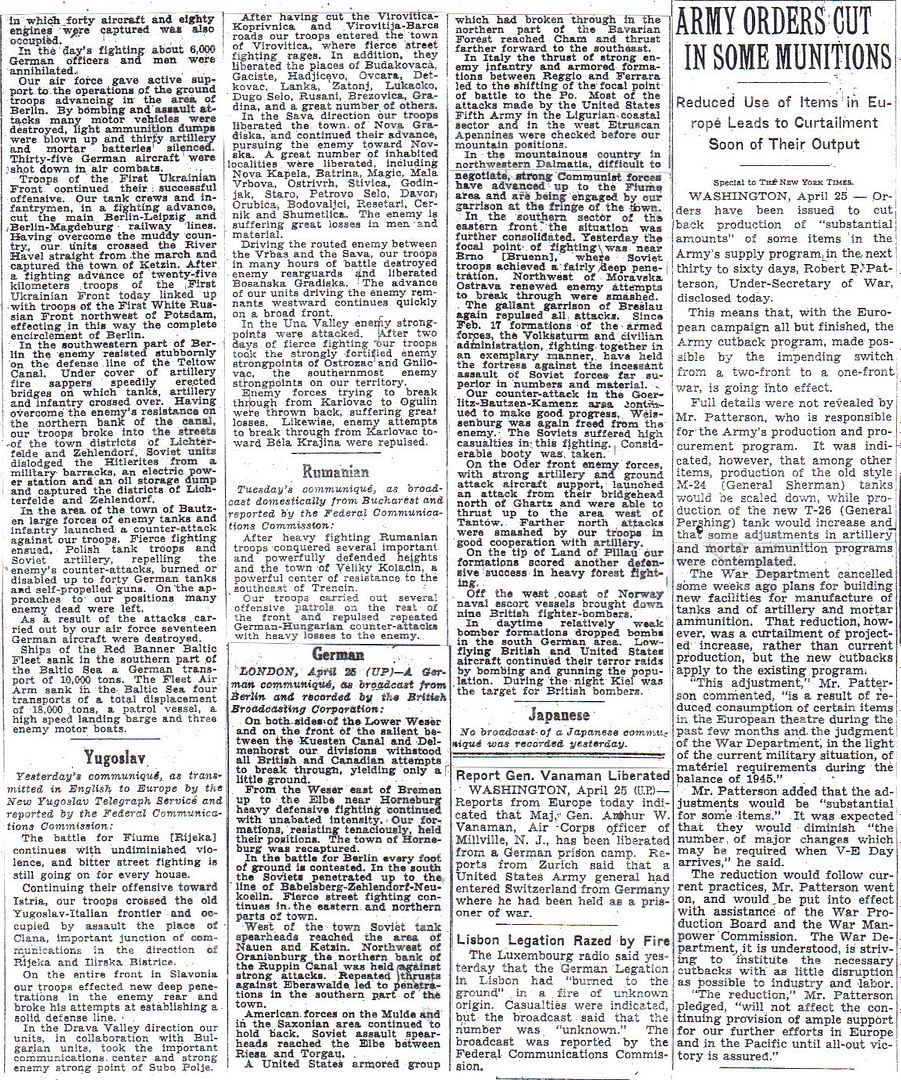

Telegram from President Harry S. Truman to Prime Minister Winston Churchill, April 26, 1945. Map Room File. Truman Papers




http://www.executedtoday.com/2012/04/26/1945-sigmund-rascher-feared-science/
Apr 26, 1945
It’s on this date in 1945 that Sigmund Rascher is supposed to have been summarily executed in Dachau.
If that’s what happened, it’s no more than Rascher deserved.
This doctor made his Nazi bones by forging a relationship with Heinrich Himmler (he married Himmler’s ex-mistress), and joining Himmler’s SS.
Rascher was doing cancer-cure experiments on animals, but once he had Himmler in his Rolodex he graduated to research on homo sapiens.
From 1941 to 1944, Rascher conducted some of the textbook ethical trespasses of Berlin’s human experimentation regime, using Dachau prisoners in:
high-altitude experiments to help fighter pilots, tested by subjecting prisoners to rapid de- and re-pressurization;
freezing experiments, tested by subjecting prisoners to freezing water or outdoor exposure, and then attempting by various methods to restore body warmth;
blood clotting experiments, tested by giving prisoners major gunshot wounds or other grievous bodily injuries, then monitoring how well a new drug slowed the bleeding.
Class act all the way. Rascher did publish some papers and deliver some conference presentations on aspects of his horrifying science, but in one of those little contradictions of the evil security state, the man was foiled in his bid for an advanced academic credential because much of the research was too secret for his peers to review.
In the end it was a much more mundane breach of ethics that did him in: Rascher and wife were arrested in 1944 for having actually kidnapped the children they claimed were their own.
They were stashed away in separate camps. For unclear reasons — perhaps because Rascher connected all this atrocious research back to Himmler, who was vainly trying to cut a peace deal with the West at this point, or maybe simply because Himmler was annoyed at the embarrassment his protege’s misconduct had given him — the bad doctor was summarily shot in his cell as the Allies bore down on Dachau.
Once again a much-needed night's rest was not possible, as the advance was resumed at once on a three battalion front. Again the resistance encountered was mainly from delaying forces and the regiment was able to reach the northwest bank of the Danube River. At 0308, April 26, after two steady days of marching and fighting, the first assault boats were launched in the river and the initial crossing was made. The order of crossing was Second Battalion, Third Battalion, and First Battalion. The entire regiment was across by 1700 the same day.
Only light resistance was encountered between the Danube and the Lech Canal and the regiment closed on the west bank of the canal by dark. The width and rapid flow of the canal made a crossing by assault boat impractical. A partially destroyed bridge was located in the Second Battalion area, and a span for foot troops was constructed. By midnight foot troops of the Second Battalion were crossing the canal, and by daylight all foot troops of the regiment had crossed, the motors waiting for a treadway bridge to be completed. The Regiment CP moved from Buchdorf to Altisheim.
The Second Battalion, upon crossing the canal, was heavily engaged by a force and to keep from exposing its flank to enemy fire, was ordered to change its direction of attack from east (town of Rain) to the south and capture the objective initially assigned to the Third Battalion. The Third Battalion, crossing after the Second Battalion, continued on the Second Battalion's initial mission and captured the town of Rain. The First Battalion, after crossing, cut to the north and completed establishment of the bridgehead. At this time the Regimental CP was established at a farmhouse north of Genderingen. The 222d Infantry began passing through the regiment on the afternoon of April 27 to continue the advance to Munich.
-------------------------
THE END IS NEAR HERE. But we didn't know it at this time. Big things were about to happen on April 29-30 on the way to Munich. No doubt there is no redoubt.
I don't think that would have been possible. By the end of the war Germany was in revolution and the military was in mutiny. The country was in no mood to continue Hohenzollern rule.
In the Austrian Empire the slavic regions were insisting on independence. Although the situation was not a turbulent, the German Austrian republicans would not stand for a continuation of the monarchy.
Although it is true that the Allied representatives, and Woodrow Wilson in particular, demanded sweeping away the old monarchies, internal dynamics were dictating the same result.
The German National People’s Party (DVNP) had a monarchist platform and had a large early-mid Weimar base. I believe Hindenberg was a monarchist.
Politics seems to takes on a life of its own sometimes.
Still hard for me to take watching the western Allies not moving an inch and allowing the communists to surround Berlin and the country around Berlin as a result of what I consider to be convouted politics and Stalin out-negotiating FDR.
I’ve been noticing that Patton’s 4th Armored has been held off the line in reserve for the past couple of weeks, I expect in recognition of its very successful spearheading.
I grew up across the street from a Hohenzollern family in California . They changed their name to Zoller.
http://ww2warstories.tripod.com/id37.htm
“The Capture of Mussolini”
(1945)
John Toland
The Last 100 Days (1966)
[On April 26, 1945] an eight-man partisan patrol ... walked down the mountains skirting the west shore of Lake Como to Domaso, a town near the north end of the lake. Their leader was Count Pier Luigi Bellini delle Stelle, a handsome man of twenty-two, with a mustache and a Mephistophelian beard and a law degree from the University of Florence. His father, a Cavalry colonel, had been captured by the Germans in 1944 and had died of maltreatment in prison.
The partisans around Como were Communist-controlled but neither Bellini nor his second-in-command, twenty-year-old Urbano Lazzaro, were Party members and, in fact, were strongly opposed to Communism. Like so many others in similar Communist-dominated groups, their main objective was to fight Germans and Fascists and help bring peace again to Italy.
Bellini’s patrol had come to town only to get tobacco, but were surrounded by a mob which hoisted them up in triumph. The war is over! a dozen voices shouted. Bellini went into an ice cream shop and heard a radio announcer say, “The Allies have crossed the Po; the German Army is in retreat ....”
....Bellini decided to act. He wrote a letter to the commander of the nearby Fascist garrison at Gravedona, demanding surrender before 9 P.M., and then told a girl to ride her bicycle down the lakeside highway toward Como and give the ultimatum to the first soldier she met. Similar notes were sent to other Fascist and German garrisons.
In the afternoon the first definite good news came in: the garrison at Ponte del Passo had surrendered. A little later, however, Bellini learned that the Germans at Nuova Olonia, near the strategic bridge at the north end of the lake, were firing machine guns at any who dared approach. Bellini and Lazzaro walked boldly up to the German stronghold and demanded a parley. Bellini claimed he was the Area Partisan Commander and threatened to blow the Germans to bits with mortars unless they surrendered. Their commander meekly handed over his revolver.
....By midnight Bellini controlled ten miles of lake-front road, from the bridge at the north to Dongo. Half a mile south of Dongo he set up a roadblock with a tree trunk, large stone blocks and barbed wire. It was a perfect cul-de-sac. On one side of the narrow highway, a bank fell off steeply to the lake. On the side rose a huge wooded boulder, the Rock of Musso. Then, exhausted by the arduous events of the day, Bellini went to bed.
....In Domaso, Bellini was wakened and told a German column was advancing on Dongo. “Tell the advance roadblock to stop the column,” he ordered. “No one is to move, whatever happens.”
Bellini sent two messengers to the north for reinforcements and, accompanied by Lazzaro, drove at top speed to Dongo. On the way he instructed Lazzaro to place all their forces in strategic positions on the great rock overlooking the roadblock while he tried to negotiate.
At Dongo a carabiniere gave Bellini the last information about the roadblock. The count started walking down the highway and in a few minutes came upon three German officers standing near the armored car. The German commander introduced himself in fairly good Italian as Hauptmann (Captain) Otto Kisnatt. “I have orders to take my men to Merano (near the Austrian border) and I intend to go there. From Merano we shall go into Germany and continue our fight against the Allies there. We have no intention of fighting the Italians.”
“On the other hand, I have orders to halt all armed enemy columns and to let no one through,” said Bellini, who had no orders but thought it would impress the Germans ....
“But our High Command and yours have come to an agreement.” Kisnatt was bluffing. “We Germans are not to attack the partisans and the partisans are to let us go free.”
“I have no such orders” .... Bellini decided to outbluff Kisnatt. “We are in control of the whole area; we are well placed and I have strong forces. You are covered by mortars and machine guns. I could wipe you out in fifteen minutes.”
Lazzaro beckoned Bellini to one side and told him there were twenty-eight trucks full of German soldiers, an armored car, the German commander’s vehicle and ten cars full of civilians. Each truck, Lazzaro said, contained a heavy machine gun, machine pistols and several light anti-aircraft guns.
Bellini knew he couldn’t contain such a force if it came to a fight. He decided to mine the Vall’orba Bridge, a few hundred yards up the road toward Dongo. But to do this required time. The count returned to the three Germans ....
“We’ve decided that we can’t take the responsibility of allowing you through without orders. Our headquarters is a mile or two away and we’ll go there for instructions. It would be advisable for one of you to go with us and establish direct contact with them.” Bellini had no idea where his division commander was. He only wanted to get Kisnatt away from his men so they would be unable to act.
....Finally Kisnatt agreed to accompany Bellini to his HQ if they could all go in a German vehicle.
In a low voice Bellini told Lazzaro to make a show of strength up ahead: every armed man should be brought out to the road and civilians induced to wear something red to make them look like partisans.
As Bellini and Kisnatt entered Dongo in a German car, they passed crude barricades and crowds of suspicious-looking men wearing red bandannas .... Bellini continued north. When Kisnatt had reached the limit of his patience, Bellini stopped the car and pretended he had to walk on alone to his HQ. He would return with the decision, he said.
At Musso, not far from the roadblock, Don Mainetti, the parish priest, was just going into his house when a bearded man ran up and said, “I must speak to you, Reverend! I’m giving myself up, but I don’t want my capture to cause any fuss. It simply mustn’t. I’ll come to your house. You call a partisan and I’ll give myself up.” It was Nicola Bombacci. Thirty years before he and Mussolini had been revolutionary Socialists .... Now he was one of Mussolini’s closest advisers.
“I’m a victim of my own stupidity,” he said. He revealed that the Duce was in the convoy down at the roadblock.
....Bellini returned to the roadblock with Kisnatt without revealing the imaginary orders he said he had received at his HQ. Everyone turned expectantly to Bellini and he knew he could stall no longer. He stared Kisnatt in the eye and said firmly, “Our decisions are; first, permission to proceed is granted only to German vehicles and German soldiers; all Italian and all civilian vehicles must therefore be handed over to us ....”
Kisnatt hesitated, then said he could not abandon his Italian allies “in the moment of danger.” But Bellini was adamant and the German asked for half an hour “to consult” with his officers.
Bellini nodded. As he sat on a wall and lit a cigarette, a priest whispered in a conspiratorial voice. “Come here!” It was Don Mainetti.
“What’s the matter?”
“Mussolini’s here! Don’t let his get away, because we’re sure he’s here.”
Bellini found it hard to believe. Nevertheless, he asked Lazzaro to investigate. Lazzaro started toward the convoy, but he didn’t take the order seriously and never carried it out.
Kisnatt returned to Bellini and said that he would accept the conditions only if they were also acceptable to the occupants of the armored car.
Bellini walked up to a group standing near the armored car, which was in the middle of the road, blocking the convoy. “Who is in command here?” he asked.
An elderly civilian wearing a military gold medal indicating that he had been disabled in battle stepped forward. “My name is Francisco Barracu and I am Undersecretary of the Cabinet.” He introduced two men standing next to him, Lieutenant Colonel Casalinovo, Mussolini’s military aide, and a Black Shirt named Utimpergher.
Bellini answered their Fascist greeting with a military salute and asked, “What are your intentions?”
“To continue with the German column, of course,” Barracu answered, somewhat surprised .... Bellini advised him to surrender. “No, we must get through at all costs. I repeat: we intend to follow the column.”
.... “Don’t delude yourselves into thinking that they will risk a fight for your sake. They don’t want to fight anymore — that’s clear.”
“Even so, we’ve got to move on,.”
Bellini repeated that it was out of the question .... “You can see that the Germans are getting nervous,” [he] said. “Since we still haven’t reached an agreement, I think that it might be better to let them proceed at least as far as Dongo, then we can resume our discussions in peace.”
To his surprise, Barracu too thought this was a good idea. Bellini told Kisnatt to move out, and the armored car pulled off to one side to let the convoy proceed. Sitting in one of the open trucks was Mussolini, huddled inside a German army overcoat.
....Bellini decided to let Barracu return to Como; after all, he was a disabled veteran. He told Barracu that the armored car could turn back in twenty minutes. “But I warn you — if you try to move forward we’ll open fire.”
The count sent word to the men on the big rock that the armored car was going to turn around. They were to fire only if it tried to go on toward Dongo instead.
At three-fifteen the armored car began moving ahead to turn around in a wide space in the road. Partisans on the big rock, however, though it was bound for Dongo and opened fire. There was a brief flurry of shots before a grenade exploded under the armored car .... Barracu was hit by shrapnel in the right arm, and Casalinovo and Utimpergher were captured on the road.
The Dongo town square would have made a perfect setting for a romantic opera. It was flanked on three sides by medieval buildings, with the snow-capped Alps as a dramatic backdrop and Lake Como at the open end.
Here Lazzaro was inspecting the German truck convoy when ... he heard someone excitedly call out, “Bill!” his partisan name. It was Guiseppe Negri, a local clog maker who had recently been in jail for three months for helping the partisans.
“Well, what is it?” asked Lazzaro.
“We’ve got the Big Bastard!” Negri whispered.
“You’re dreaming!” Lazzaro said.
“No, no, Bill, it’s Mussolini. I’ve seen him with my own eyes.”
“Where?”
“On a truck here, dressed as a German!”
This was too incredible, but Lazzaro’s pulse quickened. “You must have made a mistake!”
“I’ve seen him and I recognized him at once. I swear it’s him, Mussolini himself.” he explained that while examining the papers of the Germans in one truck, he came to a man hunched up near the driver’s cab, with a blanket over his shoulders. “I couldn’t see his face because he had raised the collar of his greatcoat and pulled his German helmet down over his face. I went to him to ask for his papers, but the Germans in the truck stopped me and said, ‘Kamerad drunk, Kamerad drunk.” The clog maker had sat beside the man and pulled down his collar. “He never moved. I only saw his profile but I recognized him at once. Bill, it is Mussolini. I swear it. I didn’t let on I knew, and got down to come and tell you.”
The two men went back along the line of open trucks until Negri stopped and pointed to a soldier with upturned collar and a German helmet pulled over his eyes. Lazzaro walked to the truck and reached up to tap the shoulder of the hunched man. “Camerata!”
When the man ignored this Fascist greeting, Lazzaro again tapped him on the shoulder and said ironically, “Eccellenza!” There was still no reaction, so Lazzaro shouted irritably, “Cavaliere Benito Mussolini!”
The figure stirred and Lazzaro was sure he recognized Mussolini. A crowd gathered as Lazzaro swung aboard the truck. He walked up to the huddled figure and took off his helmet, revealing a bald head. Lazzaro removed the man’s sun glasses and turned down his collar. It was Mussolini, clutching a machine pistol between his knees, its butt under his chin.
Lazzaro took the gun from Mussolini and raised him to his feet. “Do you have any other arms!” Without a word, Mussolini unbuttoned his coat and handed over a 9-mm. long-barreled Glisenti automatic.
The two stared at each other, and Lazzaro felt momentarily at a loss. This was a man he had both revered and cursed. Mussolini, face waxen, seemed to be waiting for Lazzaro to say something. He did not look at all afraid, only utterly tired.
The crowd began shouting angrily — two days before, four local partisans had been murdered by the Fascists.
Lazzaro wanted to say something historic. All he could think of was, “In the name of the Italian people, I arrest you!” He was surprised that his voice was so calm.
“I won’t do anything,” Mussolini said tonelessly.
“I give you my word that while you’re in my personal charge no one shall touch a hair on your head!” As soon as the words were out, Lazzaro realized it was a silly thing to say to an almost completely bald man.
“Thank you,” Mussolini said.
....Followed by a dozen curious townspeople who had pressed past the guards, Lazzaro escorted him into a long, simply furnished room overlooking the square. Mussolini took off the German coat and sat on a bench .... Lazzaro ordered the room cleared. “No one must disturb the prisoner,” he told a guard. “See that he is protected, and use your gun if necessary” .... He told a partisan to relay the news of Mussolini’s capture to Bellini, and went back to the German convoy.
“There’s a Spanish consul here who wants to leave at once,” a partisan told him.
....”Just a minute. I’ll come myself.” Lazzaro walked up to a yellow Alfa-Romeo. The driver was large, fat, fair-haired and had a birthmark on his pudgy chin. Next to him sat a beautiful young lady who looked nervously at Lazzaro. In the back seat was another woman, face half hidden in a fur collar, and two children.
Lazzaro put his foot on the running board. “Are you the Spanish consul?”
“Yes,” Marcello Petacci answered with a show of annoyance. “And I’m in a hurry.”
His perfect Italian made Lazzaro suspicious. “May I see your papers, please?”
Petacci bristled but finally handed over three yellow-backed passports stamped “Consulado Espanol en Milan.” Lazzaro didn’t like the “Spanish official” and was secretly gratified to discover that the stamp on one of the photographs was printed, not embossed. “These passports are fakes,” he said. “You are under arrest!”
....Lazzaro pocketed the passports and ordered the protesting Petacci to drive up to the Town Hall, and then went to look for Bellini.
He met the count on the road at the edge of town. “I have just captured Mussolini in Dongo,” he said matter-of-factly.
Bellini’s first thought was: What an extra load of trouble! “All right,” he said. “Let’s go and see.”
Mussolini was still sitting on the bench, staring blankly into space. To Bellini he looked old and decrepit.
Bellini said he was in command. “I give you my word that no harm will come to you.”
The Duce looked searchingly at the young count, then lowered his head and dejectedly mumbled, “Thank you.”
....Bellini ... left to take a look at the “Spaniards,” who had been taken to a small room in the Town Hall. Petacci ... asked for permission to proceed at once with his wife and children.
Bellini said that would be impossible until their papers were verified. He nodded toward Claretta [Petacci]. “Is the other lady with you?”
Petacci looked at his sister. “No, we don’t know her. She asked us for a lift and we just brought her with us.”
....”And who are you, signora?” Bellini asked, turning to Claretta. She was pretty, he thought, but looked exhausted.
“Oh, nobody in particular. I happened to be in Como during the disturbances, and to avoid being caught in any danger I asked these people for a lift so that I could get away to somewhere quiet. I’ve certainly landed myself into a mess now. What are you going to do with me?”
Bellini said that would be decided later. He saluted and left.
....Not until late that afternoon did Bellini fully realize the heavy responsibility Mussolini’s capture entailed. He had to guard against two dangers: another German column might try to free the Duce or the townspeople might murder him.
With the approval of two Communist partisan leaders ... it was decided to transfer the Duce to a safer place for the night. First he would be moved openly to the finanzieri (border guard) barracks of Germasino, about three miles up in the mountains. Then a few trusted men would secretly take him to a final hiding place.
The sun was just setting when Mussolini got into a car with a finanzieri sergeant; Bellini sat next to the driver. Followed by a truckload of partisans, they made a show of leaving town and headed up a steep, primitive road. Bellini watched Lake Como get smaller and smaller as the the horizon widened, revealing ranges of snow-covered peaks. In those mountains he had endured a year of hardship and danger. It was almost all over now and he could return home — if he had a home, if his family were still alive.
He should hate the squat man in the back seat, but strangely, he didn’t. He turned, held out a pack of cigarettes.
“No, thank you,” the Duce said, explaining that he rarely smoked.
....They were quiet. Then Bellini turned around again and said, “You have done a great many things in your life, some good, some bad. But what I’ll never understand — what I can never forgive — is that you let your men act in such an inhuman, bestial way against our comrades who fell in your hands...”
“You can’t blame me for that!” Mussolini said passionately. “It’s not true!” Beating a fist on his knee, he said he could prove it with documents.
At the barracks Bellini reassured Mussolini he was safe. “Everyone has been told to treat you with consideration and to attend to your wishes. Good-bye. We shall meet again soon. Do you want anything before I go?”
The Duce said no but changed his mind. “I should like you to give my regards to a lady you’re holding in Dongo. The lady traveling with the Spanish gentleman.”
“And what do you want me to say?”
“Oh, nothing in particular. Only that I am well, that I send her my regards and that she is not to worry about me.”
“Certainly — but tell me, who is the lady?”
....Mussolini looked furtively around the room. “It’s Signora Pettaci,” he whispered.
Like everone else, Bellini knew she was the Duce’s mistress. “I’ll give the lady your message.”
In a small room of the Town Hall Claretta Petacci asked a guard for brandy, but once it arrived she only took a sip .... She asked for coffee, tasted it daintily and said it was not good enough. She wondered if she could have another brandy. The guard told her to drink the brandy he’d just brought.
“Dust has settled on it,” she said a bit indignantly. “It might be harmful” ....
She pricked her finger with a pin and called for a doctor; then broke a fingernail and asked for a nail file.
When Bellini walked in she was alone. “Someone asked to be remembered to you,” he said quietly.
Men and equipment, no matter how good they are, eventually wear out.
Plus, being on point no doubt resulted in high attrition. They’ve done their job—time to let others pitch in.
Almost over in Europe now, or rather the Cold War is nearly begun. We can see the boundaries of postwar Europe beginning to gel and the Iron Curtain being woven.
Interesting side note - the issue references B rations, which I have never had. These were 10 man-days worth of food in a 45-lb box, meant to be prepared in a field kitchen but adequate otherwise. The C ration with which I and most members of my military generation is intimately familiar was not dependent on a field kitchen, and was only supposed to be of infrequent usage. In case anyone is curious, ham and lima beans were added to the menu in 1944. The culinary arts have never been the same since.
Wonderful story.
Sign reads: “Dachau 1000M.” 1945 April 26 - 1945 May 02

What a witch with a capital “B.” Way too “high strung.”
At the end of World War 1, nobody in Germany wanted Wilhelm or the Crown Prince, who was apparently as much of an ass as his dad. You would have had to go down the line of succession to find a good figurehead monarch.
In Austria-Hungary, the empire had only been held together by personal loyalty to Franz Josef II by his subject. He was himself an institution. When he died, the Empire died with him.
Yes, had the royal institutions remained, Hitler would not have risen. But that scenario violates Henkster’s Law.
There’s an irony there with respect to the Austro-Hungarian Empire - the one guy who had a plan to manage its peaceful dissolution was the guy whose assassination started the whole thing, Franz Ferdinand. By all reports his uncle wasn’t too pleased about it, either. If Princip had only missed...
I see General Patch’s Seventh Army mentioned in these articles, and that’s who my dad served with. On occasion I still hear new stories about his adventures in the war. At 94 he remembers the events of WWII more clearly than he does things that happened last week. And that’s not really a surprise, what he witnessed is the sort of thing that would be etched in anyone’s mind, the things that movies are made of. What happened last week is pretty ordinary.
Hah!
Disclaimer: Opinions posted on Free Republic are those of the individual posters and do not necessarily represent the opinion of Free Republic or its management. All materials posted herein are protected by copyright law and the exemption for fair use of copyrighted works.